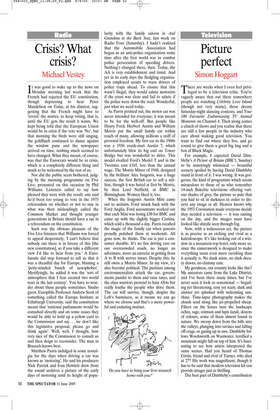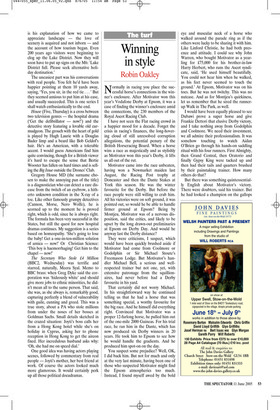Picture perfect
Simon Hoggart
There are weeks when I even feel privileged to be a television critic. You’re vaguely aware that out there somewhere people are watching Celebrity Love Island (though not very many), those dreary Saturday-night dancing contests, and Your 100 Favourite Embarrassing TV Animal Moments on Channel 4. Then along comes a clutch of shows and you realise that there are still a few people in the industry who care about making good television. You want to find out where they live, and go round to give them a great big hug and a box of Black Magic.
For example, I expected David Dimbleby’s A Picture of Britain (BBC1, Sunday) to be annoyingly whimsical — beautiful scenery spoiled by having David Dimbleby stand in front of it. I was wrong. It was gorgeous, the kind of programme which seems miraculous to those of us who remember 14-inch Bakelite televisions offering various shades of grey, the picture so pale that you had to sit in darkness in order to discern any image at all. Heaven knows why the 1953 Coronation made everyone decide they needed a television — it was raining on the day, and the images must have looked like drizzle seen through fog.
Now, with a widescreen set, the picture is as precise as an etching and vivid as a kaleidoscope. It’s like looking out of a window in a mountain-top hotel, only more so, since the camerawork is designed to make everything seem even more ravishing than it actually is. No dank mists, no dark dreary dawns, no clammy rain.
My goodness, our country looks like this? My ancestors came from the Lake District, and I’ve been there many times, but I’ve never seen it look so sensational — beguiling yet threatening, cosy yet scary, dark and sinister yet splashed with welcoming sunshine. Time-lapse photography makes the clouds scud along like jet-propelled sheep. Filters on the lenses turn the landscape ochre, sage, crimson and lapis lazuli, dozens of colours, some of them almost found in nature. We swoop down from the hills into the valleys, plunging into ravines and falling off crags, or gazing up in awe. Dimbleby follows Wordsworth on Wastwater, terrified a mountain might fall on top of him. It’s fascinating to see how artists interpreted the same scenes. Had you heard of Thomas Girtin, friend and rival of Turner, who died at 27? His work was magnificent, though it has to be said that modern television kit can provide images just as thrilling.
The best part of Dimbleby’s contribution is his explanation of how we came to appreciate landscape — the love of scenery is acquired and not inborn — and the account of how tourism began. Even 200 years ago visitors were beginning to clog up the Lake District. Now they will soon have to put up signs on the M6: ‘Lake District full. Please seek alternative holiday destination.’ The uneasiest part was his conversations with real people. You felt he’d have been happier pointing at them 10 yards away, saying, ‘Yes, you sir, in the red tie ... ’ But they seemed anxious to put him at his ease, and usually succeeded. This is one series I shall watch enthusiastically to the end.
House (Five, Thursday) is a cross between two television genres — the hospital drama (‘Get the defibrillator — now!’) and the detective story featuring a lovable old curmudgeon. The grouch with the heart of gold is played by Hugh Laurie with a Douglas Bader limp and a beard like Bob Geldof’s hair. He’s an American, with a tolerable accent. I would guess Americans find him quite convincing, though for a British viewer it’s hard to escape the sense that Bertie Wooster has fallen on hard times and is selling the Big Issue outside the Drones’ Club.
Gregory House MD (the surname chosen to make the annoying pun of the title) is a diagnostician who can detect a rare disease from the twitch of an eyebrow, a hitherto unknown condition in the X-ray of a toe. Like other famously grumpy detectives (Cannon, Morse, Nero Wolfe), he is scorned up to the moment he is proved right, which is odd, since he is always right. The formula has been very successful in the States, but still the quest for new hospital dramas continues. My suggestion is a series based on homeopathy. ‘She’s going to lose the baby! Get a one-in-ten-million solution of arnica — now!’ Or Christian Science: ‘This boy is haemorrhaging! Get him to the chapel — now!’
The Secretary Who Stole £4 Million (BBC2, Wednesday) was terrific and starred, naturally, Meera Syal. Memo to BBC brass: when Greg Dyke said the corporation was ‘hideously white’ and should give more jobs to ethnic minorities, he didn’t mean all to the same person. That said, she was, as she always is, remarkably good, capturing perfectly a blend of vulnerability with guile, cunning and greed. This was a true story, about a PA who stole millions from under the noses of her bosses at Goldman Sachs. Small details sketched in the crazed situation: Joyti’s boss calls her from a Hong Kong hotel while she’s on holiday in Cyprus, asking her to phone reception in Hong Kong to get the aircon fixed. Her incredulous husband asks why: ‘Oh, she had me on speed dial.’
One good idea was having actors playing scenes, followed by commentary from real people — Joyti’s mother, her best friend at work. Of course the actors looked much more glamorous. It would certainly perk up all those political docudramas.



















































 Previous page
Previous page